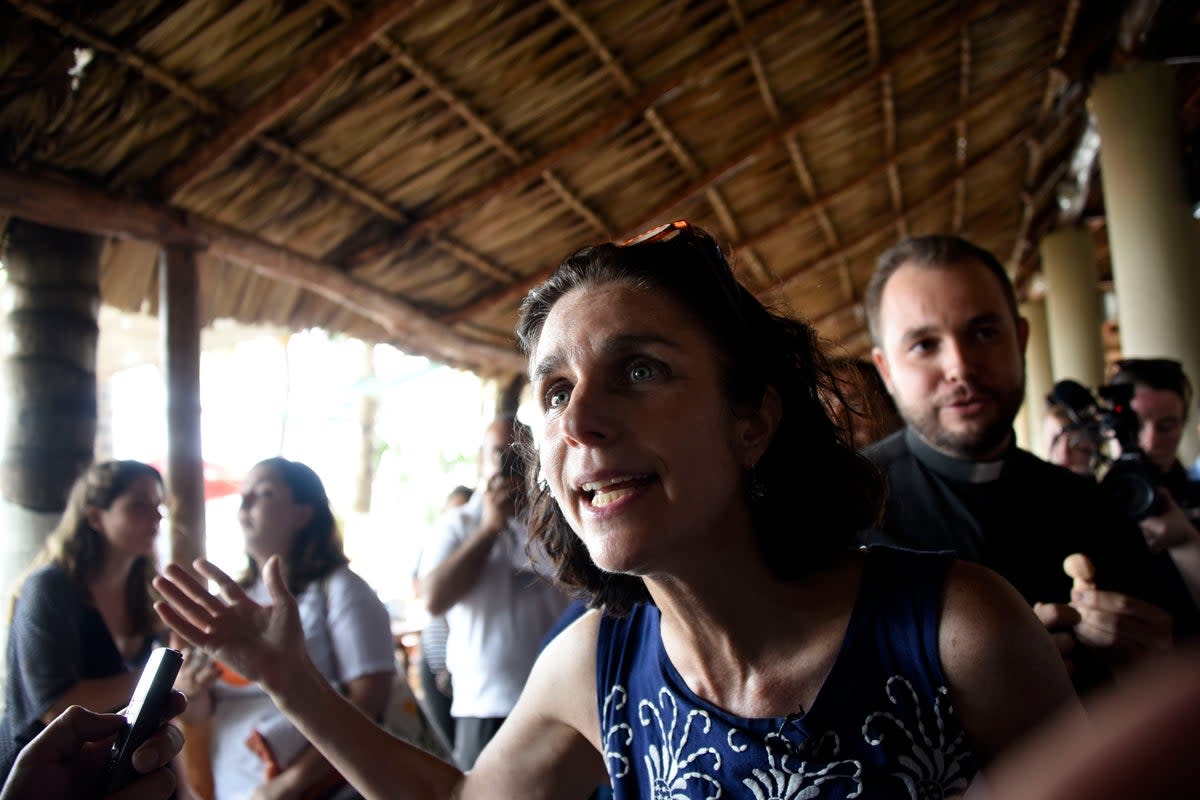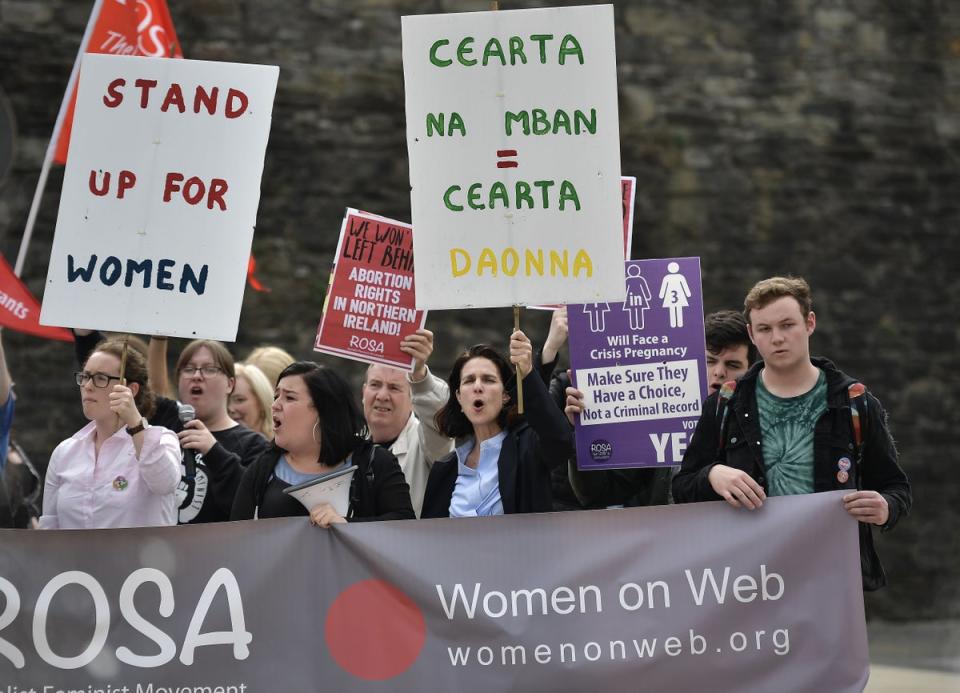How Dutch physician sending abortion pills to US could become vital doctor for millions

A Dutch physician who has been sending abortion pills to women in America says her task has never been more essential and the demand for help never so high.
As up to 25 states across the US enact total or near total bans on abortions, 56-year-old Rebecca Gomperts and her organisation Aid Access may become the most important – and most controversial – doctor in the lives of countless thousands of women.
Since 2018, her group has been writing prescriptions and then dispatching abortion medicine to women across large parts of the nation.
Since the Supreme Court last week overturned Roe v Wade, the 1973 judgment that said there was a constitutional right to abortion, she says interest in her group has soared.
Gomperts whose organsation is based in Austria, tells The Independent it is now receiving 4,000 emails a day from women in the US, up from 600 a day.
“This is unprecedented. What we've seen is that many women are really desperate,” she says.
“It shows that people will find access. And fortunately, it's a different era. The abortion pills exist, and there's the internet. And that was not the case 50 years ago.”
Three decades ago, Gomperts spent a year as the resident physician on Greenpeace’s ship Rainbow Warrior II. She speaks of the effort to help women in the US with their battle to access reproductive help with the same activist’s zeal.
“I think the most worrying part here, is that what’s been shown in the verdict, is that this is not the only human right that's going to go in the US because there are many human rights are based on the same principles,” she says. “For example, same sex marriage, and many, many other things.”
She adds: “As a world citizen, it's very worrying to see this happening in the US, because it means that democracy is crumbling and women's rights, people's rights, human rights, are disappearing. And it is becoming an autocratic regime that is now governed by some fundamentalist Christian, ancient ideology.”
Reports have pointed out demand for the abortion medication, which consists of of two drugs, mifepristone and misoprostol, taken separately and 24-48 hours apart, was already high before a draft of the a Supreme Court judgement looking at a law in Mississippi, was leaked in May.
The leaked draft of the decision over Mississippi’s 15-week ban on abortion showed not only was there a majority of justices in support of that bill, but there was enough to also overturn Roe.
From from October 2020 to December 2021, the non-profit Aid Access said it got more than 45,000 requests for the medications from women in the US.
After consulting with the Aid Access physicians, prescriptions are written, and then the actual drugs were dispatched to women’s private addresses from India, the world’s largest producer of generic medicine.
In the days since last week’s 5-4 decision – Chief Justice John Roberts voted to uphold the Mississippi law but not scrap Roe – with the appointment of three conservative justices by Donald Trump at its core, activists across the country have been scrambling how to respond. The priority is to provide services for women in large parts of the country where abortion is banned.
Medication abortions already account for more than half of all abortions in the country. But in the coming weeks and months, that proportion is likely to increase, as women in places such as Louisiana – described by one reporter as an “abortion desert surrounded by an abortion desert” – have to travel hundreds of miles to access clinics.
While medication abortion is now illegal in those states, and doctors who advise women on how to use the drugs as well as the women themselves can be prosecuted, activists believe there is a de facto loophole if medicines are being dispatched from overseas, and therefore much harder to monitor.
Gomperts and Aid Access are not the only non-profits working to provide medication abortion.
At the weekend, the New York Times said the group Just the Pill, had carried out 2,500 telemedicine consultations with doctors to supply abortion pills by mail to patients in Colorado, Minnesota, Montana and Wyoming.
Dr Julie Amaon, the group’s medical director, said within days it will establish in Colorado the first of “a fleet of mobile clinics” to park along state borders. They’re aimed at helping women from Texas, Oklahoma and South Dakota.
“By operating on state borders, we will reduce travel burdens for patients in states with bans or severe limits,” said Amaon. “And by moving beyond a traditional brick-and-mortar clinic, our mobile clinics can quickly adapt to the courts, state legislatures, and the markets, going wherever the need is.”
(The group said it was currently too busy to address any more media inquiries.)
Gomperts says her group also works with providers from the US, so they have what is in effect a hybrid system.

Asked what her group was seeking now, she says in the short term they are doing what they can.
“What is possible is there – there's telemedicine, there's groups that will help him and travel to other states. That is all set in place. There's funding for that,” she says.
But planning for the longer-term strategy is also critical.
“This Supreme Court is going to be there for another 20 to 30 years. We need to be more smart. And so one of the things that we are working on is to develop misoprostol, which is the abortion bill as a contraceptive,” she says.
“It's a very effective contraceptive method and it has no side effects like hormonal contraceptives.”
She added: “We really want to do that research to make it available, so that these medicines become more widely available and women can use it on their own terms, either as a contraceptive or as an emergency contraceptive or as an early abortion pill. We think that is where the next the next revolution can take place.”
In 1999, Gomperts set up Women on Waves, a group that used actual boats to travel to countries such as Ireland, Guatemala, and Portugal, sail 12 miles from the shore and into International waters – where the vessel was subject to Dutch law – and provide advice and abortions to women who would not have been able to access them.
Its work was featured the 2014 documentary Vessel, directed by Diana Whitten. (Ireland legalised abortion up until 12 weeks in 2018.)
The group also tried to fly medication into Poland using drones in 2015, only for the devices and the pills to be confiscated by the police.
In Guatemala, the authorities dispatched the navy. The same in Portugal. There were frequently angry scenes. Gomperts was unfazed.
“We get a lot of very grateful women,” she said in a 2017 interview with the British-based charity Human Rights at Sea.
“That’s what matters to us. That’s the only thing that is at stake. Any other actions and opinions don’t really matter. It’s the women that need help.“
We are still in Guatemala! The fight goes on! #AbortoSeguroGuatemala #freetheship #womenonwaves
— Rebecca Gomperts (@rebeccagomperts) February 26, 2017
Gomperts sees the work helping women in the US through a similar social justice lens.
“What is happening when abortion gets banned, is that it's only affecting people who have no money and no access to information. If the wife of Trump, or his daughter, if she wants to she can travel anywhere and have a safe abortion,” she says.
“So it's really only affecting people that are poor, and that don't have any resilience to those things. And that is why it is a social justice issue.”
There is another factor when thinking about banning abortion, she says.
The US has one of the highest rates of maternal mortality for a developed nation, approximately 1 in 5,000, a figure that is double for Black women. By contrast, abortion has been shown to be very safe. (In 2019, there were between an estimated 630,000 to 930,000 abortions nationally depending on which data is used.)
“What you will see that is many of these people they won't be able to access a safe abortion, because for them, it's much harder to have access to internet for example, especially in rural communities, she says. “And there will there will be people that will have to go through unwanted birth and that will lead to more maternal mortality.”
While the Biden administration has said it wants to support the provision of abortion medications, if Republicans were to return to the White House in 2024, there is no such guarantee.
Former vice president Mike Pence, among the possible challenger for the Republican nomination, is among those who has backed a national abortion ban.
“Having been given this second chance for Life, we must not rest and must not relent until the sanctity of life is restored to the center of American law in every state in the land,” he told Breitbart News.
Is Gomperts fearful that if Donald Trump, or one of his emulators, is sitting in the Oval Office, that her work can continue?
“There's no way you can stop the abortion pills from going into states and in the women's hands. It doesn't matter who's going to do it, but it's going to happen and it will be there's many many other people around that are doing it,” she says.
“No matter if he tries, he won't succeed. Let’s say it like that.”

